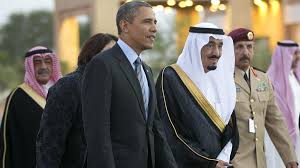
President Barack Obama arrived in Saudi Arabia on Tuesday to pay U.S. respects after the death of King Abdullah, a trip that underscores the importance of a U.S.-Saudi alliance that extends beyond oil interests to regional security.
Obama’s visit comes as Washington struggles with worsening strife in the Middle East and counts Saudi Arabia among its few steady partners in a campaign against Islamic State militants who have seized swathes of Iraq and Syria.
The U.S. security headache worsened last week with the resignation of Yemen’s government after clashes in the capital involving Iran-backed rebels – a setback to U.S. efforts to contain al Qaeda in that country and to limit the regional influence of Shi’ite Muslim Iran.
The Yemen government’s collapse will be of deep concern toSaudi Arabia because of the long border they share and because of the advance of Iran, Sunni Saudi’s main regional rival.
Saudi Arabia’s role in rallying Arab support for action with Western countries against the Islamic State, also known as ISIL or ISIS, has won praise in Washington, which along with other Western nations values the kingdom as an important market for its defense industries.
Following Abdullah’s death last week, Obama will try to get relations off to a smooth start with new Saudi King Salman, who takes power after a period of sometimes tense relations between Washington and Riyadh. Showing how crucial the Saudi alliance is for Obama, he cut short his visit to India to lead a high-ranking delegation to Riyadh.
“Whatever the final communique says, the subjects most likely to be discussed … are Syria,Iran, ISIS, and oil prices,” wrote Simon Henderson, an expert on U.S.-Saudi relations at the Washington Institute for Near East Policy.
“The most interesting question for President Obama will be whether King Salman and his team of advisers have an order of priority that differs from King Abdullah’s,” he said.
U.S. criticism of Saudi Arabia over its human rights record has normally been low-key and may remain so. Saudi authorities have been criticized by international rights groups for jailing several prominent activists, and for the public flogging this month of a blogger.
But the White House may feel pressure to at least give a nod to human rights concerns, insisting as it often does that Obama takes up such issues in private with allied leaders.
Despite an alliance between the two countries that has long been a cornerstone of U.S. Middle East policy, the oil-rich kingdom has made clear its impatience with the Obama administration’s failure to do more to oust Syrian leader Bashar al-Assad and its anxiety over U.S.–led efforts to negotiate a nuclear deal with Iran.
This added to a sense among Saudi rulers that Obama was neglecting old Arab allies, most notably with the U.S. abandonment of Egyptian President Hosni Mubarak when he was toppled by mass protests in early 2011.
U.S.-Saudi relations have improved in recent months after Obama made a fence-mending visit to Riyadh last March.
The two countries have found renewed purpose for their security partnership in the joint fight against Islamic State, though Saudi Arabia remains unhappy with Obama’s resistance to large-scale U.S. arming of the mainstream Syrian rebels.
Even though an energy-self-sufficient United States no longer relies on Saudi oil supplies, the kingdom’s willingness to keep oil output high despite tumbling global oil prices has bolstered Obama’s domestic economic recovery efforts as well as his strategy of keeping pressure on oil producers Russia and Iran. Both those nations are under international sanctions.
Still looming, however, is the prospect of a nuclear deal with Iran, which would be a major legacy achievement for Obama but which Saudi Arabia, the Middle East’s top Sunni power, worries could help strengthen Tehran’s influence in the region.
High powered delegation
President Obama is leading a high-powered, bipartisan delegation to Saudi Arabia on Tuesday, one that includes his top aides and some of his Republican critics.
Sen. John McCain, R-Ariz., who opposed Obama in the 2008 presidential election, is part of the delegation that will pay condolences to the family of the late King Abdullah bin Abdul Aziz, who died last week.
The group also includes members of the George W. Bush administration, including former Secretary of State Condoleezza Rice and ex-National Security Adviser Stephen Hadley.
Among the Obama aides in the U.S. delegation: Secretary of State John Kerry, National Security Adviser Susan Rice, and CIA Director John Brennan.
Several members of Congress are also traveling to Saudi Arabia.
“The heavyweight delegation, hurriedly assembled over the past couple of days, highlights the importance that the United States places on its relationship with Saudi Arabia, not just for its ample supplies of oil but also for its leadership in the region and its assistance with intelligence and counterterrorism efforts.” The New York Times reported on Tuesday
Reuters/ USA Today

Leave a Reply
You must be logged in to post a comment.